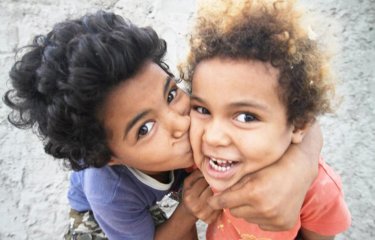Fighting childhood malnutrition
One child in four aged under 5 in the world suffer from malnutrition. Malnutrition is involved in almost half of infant mortality, more than 3 million children under age 5 each year. Malnutrition is also responsible for significant abnormalities of physical and mental development. Undernourished children have diminished cognitive performance and severe learning difficulties. Malnutrition thus fuels the vicious cycle of poverty by weighing heavily on the possibilities of social-economic development of future generations.
The lack of food or inadequate nutrition practices are however not the only causes of undernutrition. In resource-limited countries, the deteriorated sanitary and hygiene environment continuously expose children to infectious agents. These permanently weaken the children’s immune systems and cause a chronic inflammation of the intestine known as Pediatric Environmental Enteropathy (PEE). It is estimated that over 75% of children in developing countries suffer from this syndrome to various degrees. This syndrome, which disrupts the function of the intestine is recognized today as one of the major causes of malnutrition and is also associated with poor vaccine performance in children. Despite its massive impact on child health, scientific data on PEE are scarce and there are no rapid and easy to use tools to diagnose it.

In partnership with the Institut Pasteur of Madagascar and Bangui, located in two countries where the proportion of malnourished children is particularly high, Afribiota aims to identify markers for diagnosing pediatric environmental enteropathy, measure the number of children (prevalence) suffering from this syndrome and to better understand the biological mechanisms that initiate it. These results will serve as a basis for developing prevention and treatment strategies to improve the nutritional status, development and immunity of undernourished children.
A unique multidisciplinary approach to understand PEE Syndrome
Coordinated by Pr. Philippe Sansonetti and Dr Pascale Vonasch this very ambitious research project proposes for the first time to address PEE syndrome in all its complexity by combining epidemiological, anthropological, biological, motor development and nutrition studies.
A diagnostic and epidemiological study carried out on 460 children in each country (100 severely malnourished, 100 moderately malnourished and 260 having no malnutrition) will compare different PEE biomarkers in order to develop a diagnostic test easy to use in the field. This study will also provide a first estimate of the number of children suffering from this intestinal inflammation in Madagascar and the Central African Republic.

Caption: Health facility in the 6th district of Bangui : anthropometric measures are done by the Afribiota team in order to define the nutritional status of children. Credit : © Institut Pasteur de Bangui/JM Zokoué
A medical-anthropological study will analyze the dietary practices, hygiene, childcare, parental attitudes in case of illness, economic and political context ... to understand why some children develop PEE and some not.
A study of the flora (microbiota) and the intestinal barrier will allow to better describe the biological alterations of the intestine due to PEE including chronic inflammation and possibly to identify new markers for this syndrome.
A study of psychomotor development will be conducted among all children enrolled in the study. Taking into account the cultural environment of the two partner countries, a standardized test will be developed to evaluate a set of criteria (language, motor skills, cognitive skills) and identify possible links between PEE, malnutrition and psychomotor disorders.
All the data obtained in the 4 studies will be compiled via mathematical modeling and thus will provide a holistic view of the syndrome as a basis to develop effective interventions for the benefit of children's health.
The project will also include a significant local capacity building component focused on training doctors in malnutrition and Gastroenterology; training technicians to specific molecular biology techniques; training health professionals on child psychomotor development and financing of a Malagasy PhD student in anthropology.
PEE, a complex and still poorly understood syndrome

 |
 |
AFRIBIOTA project is supported by the Total Foundation and the Nutricia Research Foundation





